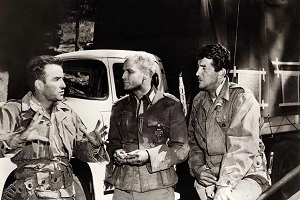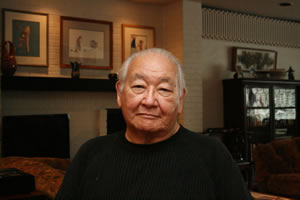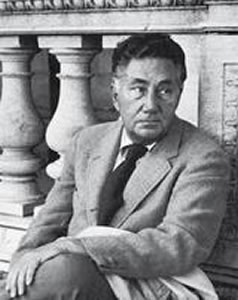De Amerikaanse schrijver James Thomas Farrell werd geboren op 27 februari 1904 in Chicago. Zie ook mijn blog van 27 februari 2007 en ook mijn blog van 27 februari 2009.
Uit: An Honest Writer. The Life and Times of James T. Farrell (Biografie door Robert K. Landers)
„James T. Farrell was once a literary titan, mentioned in the same breath with Hemingway, Faulkner and Dos Passos; and Studs Lonigan, his trilogy of novels about a swaggering young “tough guy” from a lower-middle-class Irish family on Chicago’s South Side, was considered a modern classic. But this powerful work has fallen into neglect, and a century after his birth in 1904, Farrell is a largely forgotten figure. He and his finest achievements—Studs Lonigan and his series of five novels about the O’Neills and the O’Flahertys—deserve better.
Studs Lonigan and other vivid characters in these works were rightly declared by the pioneering critic Joseph Warren Beach in 1941 to be “among the memorable people in English fiction.” But Farrell’s naturalistic novels provide more than memorable people. They afford a richly detailed picture of life in an American city as it was actually lived by ordinary people, particularly Irish-Americans, in the early decades of the twentieth century. “You forget that you are seeing this life through the eyes of a selecting novelist,” marveled critic Carl Van Doren. “It seems merely to be there before you.”
Whether in praise or in disparagement, it was often said of Farrell’s works that they were “sociology” as much as art. And indeed they were. Novelist Gerald Green, the author of The Last Angry Man, on learning in 1976 that he and Farrell shared the same publisher and editor, asked the editor to convey his admiration to the author of Studs Lonigan and the O’Neill-O’Flaherty novels. “Nothing in modern sociology, no journalism, including [Jimmy] Breslin’s, or [Daniel Patrick] Moynihan’s ‘Beyond the Melting Pot,’” said Green, “can ever tell us anything new or enriching about the urban Irish, once we have read James T. Farrell. A giant.”
James T. Farrell (27 februari 1904 – 22 augustus 1979)
De Amerikaanse (native, Kiowa) schrijver N(avarre) Scott Momaday werd geboren op 27 februari 1934 in Lawton, Oklahoma. Zie ook mijn blog van 27 februari 2007 en ook mijn blog van 27 februari 2009.
Before an Old Painting of the Crucifixion
I ponder how He died, despairing once.
I’ve heard the cry subside in vacant ski
es,
In clearings where no other was. Despair,
Which, in the vibrant wake of utterance,
Resides in desolate calm, preoccupies,
Though it is still. There is no solace there.
That calm inhabits wilderness, the sea,
And where no peace inheres but solitude;
Near death it most impends. It was for Him,
Absurd and public in His agony,
Inscrutably itself, nor misconstrued,
Nor metaphrased in art or pseudonym:
A vague contagion. Old, the mural fades…
Reminded of the fainter sea I scanned,
I recollect: How mute in constancy!
I could not leave the wall of palisades
Till cormorants returned my eyes on land.
The mural but implies eternity:
Not death, but silence after death is change.
Judean hills, the endless afternoon,
The farther groves and arbors seasonless
But fix the mind within the moment’s range.
Where evening would obscure our sorrow soon,
There shines too much a sterile loveliness.
No imprecisions of commingled shade,
No shimmering deceptions of the sun,
Herein no semblances remark the cold
Unhindered swell of time, for time is stayed.
The Passion wanes into oblivion,
And time and timelessness confuse, I’m told.
These centuries removed from either fact
Have lain upon the critical expanse
And been of little consequence. The void
Is calendared in stone; the human act,
Outrageous, is in vain. The hours advance
Like flecks of foam borne landward and destroyed.
N. Scott Momaday (Lawton, 27 februari 1934)
De Amerikaanse schrijver Peter de Vries werd geboren op 27 februari 1910 in Chicago als zoon van Nederlandse immigranten. De Vries was een zeer bekende Amerikaanse romanschrijver in de jaren ’60 en ’70, geroemd om zijn geestigheid. Hij verloor – net als Don Wanderhope in ‘Het lam’ uit 1961 – zijn dochtertje aan leukemie. Hij studeerde aan de Northwestern University en had een groot aantal baantjes, van karamelappelverkoper tot radioacteur enjournalist voor de New Yorker. Een aantal van zijn boeken zijn verfilmd. De Vries was een uiterst vruchtbaar schrijver. Hij publiceerde talrijke korte verhalen, essays, gedichten, toneelstukken en romans.
Uit: The Last Hurrah
“Tom had been putting aside $250 from his fortnightly pay packet over a two month period. He figured $1000 should just about cover it: his last hurrah. One afternoon/evening/night of debauchery. Living it up, trying everything he’d always meant to try.
The last hurrah. Before settling down and really doing the serious stuff.
That stuff: getting married to Kirralyn in a month’s time; being there when she had their baby in three month’s time; putting the deposit down on a house A.S.A.P. – as soon as they could both agree on a house.
He’d already selected the date for the last hurrah – Wednesday July 11. He had even made a booking at a hotel – a place in the centre of Kings Cross. He’d viewed it on the Internet. It looked classy. Nothing downmarket, not for the last hurrah.
The list of debauchery: room service food, drinking, drugs, and a prostitute.
Tom had experienced room service food before. Always with Kirralyn. They loved it. He also liked a drink – usually down the pub on a Friday afternoon after work. With the boys. The usual crowd. His mates.
Tom had never tried drugs. A couple of his mates had. They’d used marijuana, amphetamines, even cocaine (or so they said). Tom hadn’t even smoked marijuana back at school. Back then he knew people who did smoke it, but he’d been too scared to touch it – thanks to all the anti-drug propaganda from his teachers and his parents.
Now he wanted to try marijuana. Just once. That’s all. Get stoned, have a giggle.
Then there was the prostitute. He’d never been with one. In fact he’d only ever been with one girl apart from Kirralyn. Tom had never had a blow job. Kirralyn refused to perform that “act” (as she called it) on him.
He wanted one now. And he’d get one – from a professional. He didn’t even think of it as cheating because he wouldn’t actually be fucking, would he?
Kings Cross: debauchery capital of Sydney, of Australia. Drug and sex HOTSPOT. Tom had lived in Sydney all his life, but he’d only ever been to the Cross once. In the daytime, when the place was dead. He’d seen no drug dealers, no sex workers. Just ordinary people. But that was years ago.
Now things were different. Tom read the newspapers, he watched the current affairs shows on the TV. He knew about the place: drugs everywhere, sex everywhere. You walk down the main drag and they’d virtually shove it in your face.
So to Kings Cross Tom would go. For the last hurrah.
Peter De Vries (27 februari 1910 – 28 september 1993)
De Franse schrijver en dichter Jules Lemaître werd geboren op 27 februari 1853 in Vennecy, Loiret. Zie ook mijn blog van 27 februari 2007 en ook mijn blog van 27 februari 2008 en ook mijn blog van 27 februari 2009.
Uit: Ernest Renan
„Par quel autre pourrais-je mieux commencer ? Nul écrivain peut-être n’a tant occupé, hanté, troublé ou ravi les plus délicats de ses contemporains. Qu’on cède ou qu’on résiste à sa séduction, nul ne s’est mieux emparé de la pensée, ni de façon plus enlaçante. Ce grand sceptique a dans la jeunesse d’aujourd’hui des fervents comme en aurait un apôtre et un homme de doctrine. Et quand on aime les
gens, on veut les voir.
Les Parisiens excuseront l’ignorance et la naïveté d’un provincial fraîchement débarqué de sa province, qui est curieux de voir des hommes illustres et qui va faisant des découvertes. Je suis un peu comme ces deux bons Espagnols venus du fin fond de l’Ibérie pour voir Tite-Live et ” cherchant dans Rome autre chose que Rome même.” Le sentiment qui les amenait était naturel et touchant, enfantin si l’on veut, c’est-à-dire doublement humain. Je suis donc entré au Collège de France,^ dans la petite salle des langues sémitiques.
A quoi on pourtant ? N’est-ce point par leurs livres, et par leurs livres seuls, qu’on connaît les écrivains et surtout les philosophes et les critiques, ceux qui nous livrent directe-
ment leur pensée, leur conception du monde et, par là, tout leur esprit et toute leur âme ? Que peuvent ajouter les traits de leur visage et le son de leur voix à la connaissance que nous avons d’eux ? Qu’importe de savoir comment ils ont le nez fait ? ^ Et s’ils l’avaient mal fait par hasard ? ou seulement fait comme tout le monde ?“
Jules Lemaître (27 februari 1853 – 5 augustus 1914)
De Nederlandse schrijver Albert Kuyle werd geboren in Utrecht op 17 februari 1904. Albert Kuyle was een pseudoniem voor Louis Maria Albertus Kuitenbrouwer. Met zijn werk droeg Kuyle volgens Hendrik Marsman en andere jonge tijdgenoten bij aan de vernieuwing van het proza in het Interbellum. De techniek van met name zijn vroege proza is bijna filmisch van aard, waardoor Kuyle kan worden gezien als vertegenwoordiger van de Nieuwe Zakelijkheid. In 1924 was Kuyle één van de oprichters van het tijdschrift De Gemeenschap waarvan hij tot zijn vertrek in 1932 redactielid was. Aan het begin van de jaren 30 ontstond binnen de redactie van De Gemeenschap, dat indertijd het brandpunt vormde van de rooms-katholieke jongeren, onenigheid over de te volgen koe
rs. Kuyle en de zijnen scheidden zich in 1933 af van De Gemeenschap, en richtten onder de naam De Nieuwe Gemeenschap (1934-1936) een concurrerend tijdschrift op. De redactie sympathiseerde allengs met het opkomende fascisme en met name Kuyle liet zich hierbij in toenemende mate uit in antisemitische bewoordingen.
Uit: Het kleinste hoofd
„Inspecteur Fernando Hernandez heeft een nieuwe hoed noodig. Deze week is het feest van San Lazaro, en hij hoort tot de notabelen van de parochie. Hij ziet een lichte grijze in de étalage die hem zou lijken, maar hij heeft geen tijd om nu te gaan passen. Passen is voor hem vervelend. Hij heeft, zoover hij weet, het kleinste hoofd van de stad. De dienst wacht. Er zijn vrouwen die de stadsfontein hebben verontreinigd. Vergrijp tegen artikel 268. De volgende morgen plast de zon; de inspecteur staat voor de toonbank, en vraagt om de hoed die hij gisteren zag. De hoed is verkocht. Een andere van dezelfde soort? Er was er maar één. Inspecteur Hernandez zal dan naar het feest van San Lazaro gaan met zijn oude hoed, want hij kan geen keus maken.
Om 3.10 ’s middags rijdt de inspecteur naar San Luigi. Een lijk op een bleekveldje; het moet met grove hagel uit een oud model jachtgeweer zijn gedaan, op vier pas afstand. Het gezicht is weggeschoten. De inspecteur ondervraagt twee uur lang. Een meisje heeft een man hard zien loopen met een lichte grijze hoed; een man die niet bekend is in San Luigi. Verder niets. De inspecteur weet intuïtief dat er een veete is beëindigd. Dat gebeurt meestal met grove hagel.
Het rapport is niet lang. De lijkschouwing zal morgen plaats vinden.
De volgende morgen. Er komt een boodschap van de hoedenwinkel. Inspecteur Hernandez zal toch geholpen kunnen worden. Hij is er om elf uur; op de toonbank ligt de hoed die eergisteren in de etalage stond. De man die hem kocht is hem komen ruilen. De inspecteur past de hoed: hij is te klein. Dan ontdekt hij de reep papier die onder de leeren band is geschoven. De man die hem een dag droeg, had nog een kleiner hoofd dan hij. Als het papier er uit is, betaalt de inspecteur en gaat met de nieuwe hoed naar huis.“

Albert Kuyle (17 februari 1904 – 4 maart 1958)
De Duitse schrijver Johannes Wilhelm Meinhold werd geboren op 27 februari 1797 in Netzelkow op Usedom. Zie ook mijn blog van 27 februari 2009.
Uit: Die Bernsteinhexe
“Unser Manuskript, in welchem die ansehnliche Zahl von sechs Kapiteln fehlt und welches auf den nächstvorhergegangenen Blättern unstreitig sich über den Ausbruch des Dreißigjährigen Krieges auf der Insel Usedom verbreitet hat, beginnt mit den Worten: »Kaiserliche gehauset« und fährt dann fort wie folgt:
… Koffer, Truhen, Schränke waren allesamt erbrochen und zerschlagen, auch mein Priesterhemd zerrissen, so daß ich in großen Ängsten und Nöten stande. Doch hatten sie mein armes Töchterlein nit gefunden, maßen ich sie in einem Stall, wo es dunkel war, verborgen, denn sonst, sorge ich, hätten sie mir noch mehr Herzeleid bereitet. Weil nun aber ich bittern Hunger litte, so schrieb an Se. Gestrengen, den Herrn Amtshauptmann Wittich von Appelmann auf Pudagla, daß er mir zukommen ließe, was Se. fürstliche Gnaden Philippus Julius mir vom Kloster zu Pudagla beigeleget, als nämlich 30 Scheffel Gerste und 25 Mark Silbers, welche Se. Gestrengen mir aber bis nunmehro geweigert, denn er war ein fast hart und unmenschlicher Mann. – Aber er antwortete mir nit, und ich wäre schier verschmachtet, wenn Hinrich Seden nicht für mich im Kapsel gebetet Almosen in der Kirchspielgemeinde eingesammelt. Er wurde dazumalen auch schon alt und hatte viel Plage von seinem bösen Weibe Lise Kolken, angesehen sie im gemeinen Geschrei war, daß sie lange mit Wittich Appelmann in Unzucht gelebet, welcher von jeher ein rechter Erzschalk und absonderlich ein hitziger Schurzenjäger gewest, denn so etwas gesegnet der Herre nicht. Selbiger Seden nun brachte mir 5 Brote, 2 Würste und eine Gans, item eine Seite Speck. Möchte ihn aber vor seiner Frauen schützen, welche die Hälfte hätte vor ihr behalten wollen, und da er sich geweigert, hätte sie ihn ver
maledeiet und die Kopfgicht angewünschet, so daß er gleich ein Ziehen in der rechten Wangen verspüret, welches jetzunder fast hart und schwer geworden.”

Wilhelm Meinhold (27 februari 1797 – 30 november 1851)
Zie voor onderstaande schrijver ook mijn blog van 27 februari 2007.
De Zwitserse schrijver Traugott Vogel werd op 27 februari 1894 als zoon van een groentehandelaar in Zürich geboren.


















